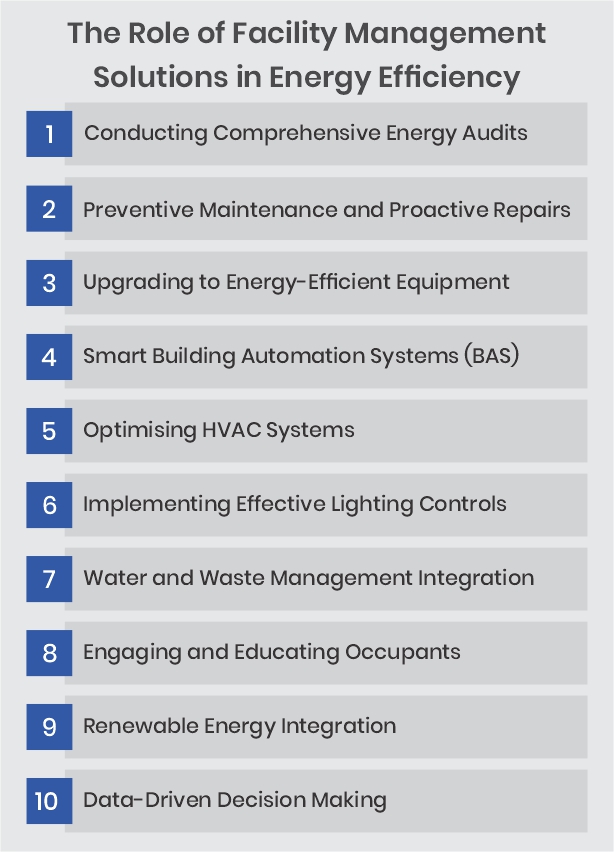Effective Facility Management Solutions play a vital role in reducing energy consumption across India’s commercial and industrial sectors. By combining audits, preventive maintenance, smart technologies, and occupant engagement, the top facility management companies help businesses cut costs, boost efficiency, and meet sustainability goals. This blog explores practical strategies for facilities and management teams to optimise energy use, highlighting how integrated Maintenance and Operations India practices contribute to a greener, more cost-effective future.
How Effective FM Strategies Can Reduce Energy Consumption
In today’s rapidly evolving world, rising energy costs and the increasing urgency to reduce carbon emissions have made energy efficiency a top priority for businesses in India. From sprawling corporate campuses to industrial plants and multi-tenant commercial complexes, energy consumption is one of the largest operational expenses. Here’s where Facility Management Solutions play a critical role, they not only ensure smooth day-to-day operations but also implement strategies that directly impact energy use, cost savings, and sustainability.
In this blog, we explore how effective facilities and management practices, when implemented by the top facility management companies in India, can dramatically reduce energy consumption and support businesses in achieving their environmental and financial goals.
Understanding the Energy Challenge in India
India is the world’s third-largest energy consumer, with demand expected to double by 2040. The commercial and industrial sectors account for a significant share of this energy use, and inefficient infrastructure often leads to unnecessary wastage. Old equipment, lack of preventive maintenance, poor building design, and unmonitored usage contribute to high energy bills. With this backdrop, Maintenance and Operations India has witnessed a shift towards smarter, more integrated facility management (FM) practices that align with national goals for energy efficiency and sustainability.
The Role of Facility Management Solutions in Energy Efficiency

Facility Management Solutions encompass a wide range of services designed to keep facilities functional, safe, efficient, and sustainable. From HVAC systems and lighting to water management and waste control, every aspect of operations can be optimized to cut down energy consumption. The top facility management companies leverage technology, skilled manpower, and industry best practices to design and execute strategies tailored for each facility. Let’s break down some of these strategies that make a measurable difference.
1. Conducting Comprehensive Energy Audits
An effective energy management plan starts with knowing where you stand. Facility managers conduct detailed energy audits to identify wastage points and inefficiencies in existing systems.
These audits assess:
- HVAC system performance
- Lighting design and automation
- Equipment runtime and maintenance gaps
- Insulation and building envelope leaks
- Employee usage patterns
Insights from these audits help create a baseline and roadmap for energy-saving measures. Regular audits ensure that improvements remain on track and deliver tangible savings.
2. Preventive Maintenance and Proactive Repairs
Unplanned equipment breakdowns not only disrupt operations but often cause spikes in energy consumption. For example, a clogged air filter in an HVAC system can make the unit work harder, consuming more power. Maintenance and Operations India leaders stress on a robust preventive maintenance plan, routine inspections, timely repairs, and equipment servicing. This keeps systems running at optimal efficiency, extends asset life, and prevents energy wastage.
3. Upgrading to Energy-Efficient Equipment
Old, outdated systems are among the biggest culprits for excess energy use. Upgrading to energy-efficient alternatives is one of the most impactful strategies facilities and management teams adopt.
Examples include:
- Installing LED lighting instead of fluorescent or incandescent bulbs
- Upgrading old chillers and boilers to high-efficiency models
- Using variable frequency drives (VFDs) in motors and pumps
- Switching to energy-efficient appliances and office equipment
Although such upgrades require upfront investment, they quickly pay back through significant reductions in monthly utility bills.
4. Smart Building Automation Systems (BAS)
Digitalisation has transformed how the top facility management companies approach energy management. Smart Building Automation Systems integrate sensors, IoT devices, and AI-powered platforms to monitor and control energy use in real time.
Key benefits include:
- Automatic adjustment of lighting and HVAC based on occupancy
- Remote monitoring and control of equipment
- Predictive analytics to flag inefficiencies before they escalate
- Energy usage data and reports for better decision-making
BAS reduces human error and ensures optimal energy usage without compromising occupant comfort.
5. Optimising HVAC Systems
HVAC (Heating, Ventilation, and Air Conditioning) systems can account for up to 50% of a building’s total energy use. Facilities and management teams can significantly reduce this by:
- Calibrating thermostats correctly
- Using zoning to heat/cool only occupied spaces
- Cleaning ducts and filters regularly
- Installing programmable thermostats and occupancy sensors
In India’s varied climate zones, regional customisation of HVAC strategies is essential for maximum efficiency.
6. Implementing Effective Lighting Controls
Lighting is another major area of opportunity for energy savings. Beyond switching to LED lighting, facilities can implement:
- Motion sensors and timers in low-traffic areas
- Daylight harvesting systems that adjust artificial lighting based on natural light availability
- Dimmable lights in conference rooms and open workspaces
Such measures can reduce lighting costs by 30-50% while creating a more comfortable work environment.
7. Water and Waste Management Integration
Though not directly linked to electricity consumption, efficient water usage and waste management can contribute indirectly to lower energy costs. For example, facilities that recycle water for cooling systems or use low-flow fixtures reduce the energy required for pumping and heating water. Similarly, proper waste segregation and recycling reduce the load on energy-intensive disposal processes. The top facility management companies in India offer integrated solutions that combine energy, water, and waste management for holistic sustainability.
8. Engaging and Educating Occupants
Technology and upgrades alone can’t deliver the full benefit of energy efficiency without occupant support. Behavioural changes, like turning off unused lights, setting ACs to optimal temperatures, or shutting down workstations after hours, add up to big savings. Many forward-thinking Facility Management Solutions providers conduct awareness campaigns, training sessions, and reward programs to motivate employees to adopt energy-saving habits.
9. Renewable Energy Integration
Another evolving trend in facilities and management is integrating on-site renewable energy sources, like rooftop solar panels. While the initial cost is higher, renewable energy helps offset grid electricity consumption and can even generate surplus energy for net metering benefits. Many industrial and commercial complexes in India are adopting hybrid energy models, a combination of grid, solar, and even wind energy, to meet their sustainability commitments.
10. Data-Driven Decision Making
Finally, data is the backbone of modern Facility Management Solutions. By using Energy Management Systems (EMS), facilities can track consumption patterns, identify anomalies, and make data-driven decisions for continuous improvement. Reports and dashboards help the top facility management companies India demonstrate savings to clients and find new areas for optimization.
Case Study: Energy Efficiency Success in India
Let’s look at a real-world example to understand the impact of effective FM strategies.
A leading IT park in Bangalore partnered with one of the top facility management companies to overhaul its energy management practices. Through a combination of energy audits, retrofitting old equipment, installing smart sensors, and educating occupants, the facility reduced its energy consumption by 28% within two years. This not only resulted in annual savings of several crores but also helped the client secure a prestigious green building certification, boosting its brand image.
Why Work with the Top Facility Management Companies
While implementing these strategies might sound straightforward, it requires deep expertise, skilled manpower, and access to the latest technologies. The top facility management companies in India bring years of experience, industry partnerships, and customized solutions to the table.
From initial assessments to execution and continuous monitoring, outsourcing energy management to trusted professionals ensures that businesses meet their sustainability targets without disrupting daily operations.
Future Outlook: Sustainability as a Business Priority
As India pushes for its net-zero goals, sustainable energy practices are no longer optional, they are a business imperative. Clients, investors, and regulators increasingly expect companies to demonstrate measurable efforts in reducing their carbon footprint.
Forward-thinking businesses that invest in robust Facility Management Solutions not only reduce operational costs but also future-proof themselves against stricter environmental norms.
Conclusion
Energy efficiency is not a one-time project but an ongoing journey of improvement. By partnering with the top facility management companies, Indian businesses can adopt world-class strategies for Maintenance and Operations India, reduce energy wastage, cut costs, and play a vital role in building a greener future.
Effective facilities and management practices make all the difference, transforming buildings into smart, efficient, and sustainable assets that deliver long-term value to owners, occupants, and the planet.
Are you ready to take the first step towards energy-efficient operations? Partner with experienced Facility Management Solutions providers today and see how much you can save, for your bottom line and for a sustainable tomorrow.
Industries we serve:
Automobile | Ancillary | Manufacturing | Pharmaceutical | Healthcare | Oil and Gas | FMCG | Education | Real Estate | Commercial
Also read: The Role of Robotics in the Future of Facility Management

